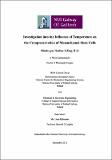| dc.contributor.advisor | Kilmartin, Liam | |
| dc.contributor.author | Norkus, Mindaugas | |
| dc.date.accessioned | 2013-07-31T12:05:32Z | |
| dc.date.available | 2013-07-31T12:05:32Z | |
| dc.date.issued | 2012-09-28 | |
| dc.identifier.uri | http://hdl.handle.net/10379/3579 | |
| dc.description.abstract | Mesenchymal Stem Cells (MSCs) are utilised in regenerative medicine due to their
multilineage differentiation potential, ease of isolation, capacity for in vitro
expansion and wide-spread availability in the adult tissues. Their therapeutic
applications have been widely demonstrated. In order to facilitate their transition
from a bench to bedside therapeutic, on-demand availability of cells is required.
Cryopreservation is thus a crucial element in achieving this goal as it permits the
long term stabilisation of biological cells. For successful cryopreservation, ultra-low
temperatures are needed. However, uncontrolled elevated temperatures cannot be
avoided in certain situations. The work presented in this thesis focuses on the
investigation of the influence of temperature elevation on the cryopreservation of
MSCs. This thesis comprises of three separate components. The first section
examines the temperature variations of cryopreserved stem cells during
transportation, using conventional solid CO2 as the cryogenic agent. It was observed
that significant temperature variations can occur using this method of transportation.
The second study investigates the effects of temperature elevations of cryopreserved
MSCs derived from rats. A multiple regression model composed of two exponentials
is proposed to approximate the detrimental effects on cell viability. It demonstrates
that temperature elevations have an imminent detrimental effect on cell viability. The
topic is further elaborated in a subsequent study which uses human-derived MSCs as
well as a larger sample set. In addition, an active learning sampling strategy in
conjunction with Gaussian process data model is presented which attempts to
maximise the information return from the experiments. This study demonstrates the
existence of a 'lethal' region causing the highest detrimental effect to cell viability. | en_US |
| dc.rights | Attribution-NonCommercial-NoDerivs 3.0 Ireland | |
| dc.rights.uri | https://creativecommons.org/licenses/by-nc-nd/3.0/ie/ | |
| dc.subject | Cryopreservation | en_US |
| dc.subject | Mesenchymal Stem Cells (MSCs) | en_US |
| dc.subject | Machine learning | en_US |
| dc.subject | Electrical & Electronic Engineering | en_US |
| dc.subject | Engineering and Informatics | en_US |
| dc.title | Investigation into the Influence of Temperature on the Cryopreservation of Mesenchymal Stem Cells | en_US |
| dc.type | Thesis | en_US |
| dc.contributor.funder | Irish Research Council for Science, Engineering and Technology | en_US |
| dc.local.final | Yes | en_US |
| nui.item.downloads | 1067 | |


